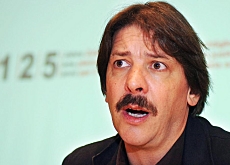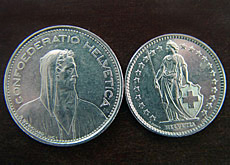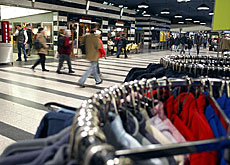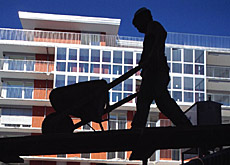Swiss unions celebrate and pledge to fight on

The Swiss Federation of Trade Unions marked its 125th anniversary in Bern on Saturday but remained as committed to better working conditions as ever.
The organisation’s president Paul Rechsteiner stressed the importance of trade unions in a world of “rampant neoliberalism”.
At the opening of the conference Rechsteiner told trade-union members and big names from culture, science and politics – including Swiss Foreign Minister Micheline Calmy-Rey – that much had been achieved over the years but many areas of conflict remained.
He said that since the first trade unions at the beginning of the 19th century, it had become clear that wages were not just a question of economics but also of power.
“Today’s rampant neoliberalism and its cult of inequality mean the old questions of distribution have taken on a new importance,” said Rechsteiner, who described the campaign for a minimum monthly wage of SFr3,000 ($2,300) as one of the unions’ greatest recent successes.
Referendum power
Rechsteiner pointed out, though, that one topic of current disagreement is that of working hours.
A nationwide vote is set to take place on November 27 on whether to allow shops at major railway stations and airports to open 365 days a year.
Trade unions have warned that moves to relax Switzerland’s tough Sunday trading restrictions will lead to a seven-day working week across the country.
Rechsteiner said Swiss unions today have considerable weight in referendums and possess a much-improved ability to mobilise themselves.
He said everyone must realise that striking is a fundamental right and an inseparable part of democracy.
European unions
Calmy-Rey said in her speech that Switzerland needs strong unions.
“Strong unions mean a strong democracy,” she said, adding that unions were to a sizeable extent responsible for Switzerland’s good relations with the European Union.
She said that thanks to unions’ involvement and commitment, Switzerland had proved itself as a solid partner and business location and social protection had improved.
“This is the sort of responsible politics with which we maximise the interests of our country and its inhabitants,” she said. “It also enables us to look after our responsibilities towards our European partners.”
swissinfo with agencies
The Swiss Federation of Trade Unions is Switzerland’s largest union of workers and comprises six unions and some 380,000 members.
When it was founded in 1880, it had 133 members.

In compliance with the JTI standards
More: SWI swissinfo.ch certified by the Journalism Trust Initiative



You can find an overview of ongoing debates with our journalists here . Please join us!
If you want to start a conversation about a topic raised in this article or want to report factual errors, email us at english@swissinfo.ch.